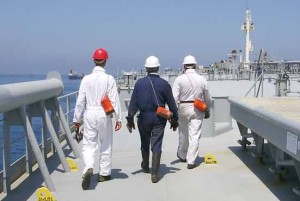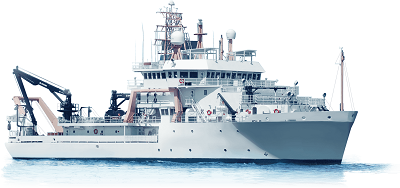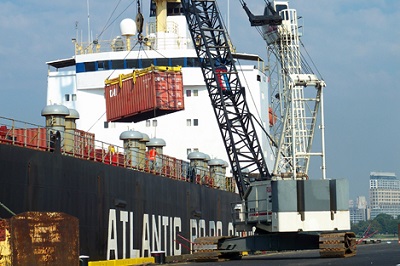Why Ship Inspection Is Necessary

Mr. Mathew Alalade is the National President of Nigeria Merchant Navy Officers and Water Transport Senior Staff Association; he is also a ship inspector. In this week’s edition of your favourite educative column, Shippers’ Guide, he educates you on the necessity for inspection on ships, the facilities required to carry out inspection, the interval and other necessary information about ship inspection. It is definitely going to add more to your wealth of maritime knowledge.
How does ship inspection enhance safety at sea?
When you are talking of safety at sea, it involves some aspects. We have a convention that spells out safety at sea. We call it Safety of Life at Sea (SALAS). As an inspector, you have an important part to play to ensure safety at sea. You have to make sure that the machineries are working effectively. As you have Federal Road Safety Corps (FRSC), that is how we have safety on board vessel. We do annual maintenance survey. You put your ship to annual test or class it, so that the safety will be enhanced. If you don’t do annual inspection or survey, then your safety is compromised somehow. There is also the communication aspect which has to be inspected too. There are items in the communication that expire like the batteries and some equipment on deck that expire; they should be replaced with new ones. We check all these annually so as to make life at sea safer. If any ship does not comply or is not compliant, then it will be made known as a deficiency in the part of the owners of the ship or the operators.
Safety entails many aspects like I mentioned earlier. There is the life raft, life jacket which has to be checked from time to time whether it is buoyant and the life raft whether it can sustain in emergency, to see if some folds are still intact or they have expired.
Another aspect is pollution, you have to keep the sea clean and safe for those who are using it especially in the port, you don’t pollute the water. Thank God, we are being compliant in our ports now unlike in those days where people just throw things in the water anyhow.
NPA is doing its own part, and NIMASA too is trying its best to curtail or stop marine pollution. So safety is very important even in our day-to-day activities, if you have not imbibed the safety culture, then you are in danger. So safety must be paramount in everything we are doing especially at sea.
You are a ship inspector, what is it all about?
Like I told you before, ship inspection entails keeping the vessel in class, fit for the operators, charterers even for the owners and for the flag. The survey or inspection is to update on the latest innovation of the International Maritime Organisation (IMO), to let them know what is in vogue in the convention worldwide. Most ship owners and operators do not know these things, so they need to be taught or shown how it operates, but the surveyors know all these things, that is why they have to let the operators and ship owners know them too, so that both the crew, the ship and cargo will be safe at sea.
At what interval do you carry out inspection on a ship?
We have the annual inspection; it can also be inspected at random maybe interval of three months. The port state control may come on board anytime to inspect. When a ship gets to any port, the port state control will come on board to inspect whether it is still compliant. Apart from the annual survey, we have random survey too.
What are the equipments used in Ship Survey?
About communication safety, there is beacon tester; it tests if a vessel is in distress. The beacon emits signal to the sate light, giving information to the sate light and at that moment, they will know that there is a problem. This beacon tester is called Emergency Position Indicating Radio Beacon (EPIRB). It tests the overall performance of the beacon. Then there is also the meter to test some of the electronic equipments used on board. There is also the transponder, which attracts the attention of other ships around if a ship is in distress, so that it can be rescued from whatever problem.
We have a tester that tests the efficacy and effectiveness of these equipments. In the engine room too, there are ways of making sure that they are up to speed.
What are the other actors that can make a ship not to be sea worthy?
A ship that does not have EPIRB is not seaworthy, a secondary means of alerting, the primary means like the VHF is a must for any ship to embark on any journey. It is a means of communication. If it is faulty or stopped working, then the ship cannot sail. If the machinery, the life raft and other things are not safety certified by an inspector, then the ship cannot sail, unless those things are preplaced or put in order. If not, the lives of the crew and properties on board the vessel are endangered.
If a ship’s engine is not functioning properly and it sets for sailing and starts having problem enroute; lives of the crew will be in danger and maybe if the ship is sailing to North Africa, it may drift to South Africa if it develops fault on the way. The ship will be grounded until it repairs and replaces all the faults and equipments. So, if a ship has a deficiency, it cannot sail until it rectifies them. All the changeable equipments aboard a vessel should have spare so that if one packs up, the spare will come handy. A good example is radar, there should be two so that if one packs up, the other one will do job.
What about if equipment packs up while on sail and you replaced it and the spare too developed a fault, what will happen in that situation?
It is a very rare situation. If one of the equipment for instance gets faulty, then the ship must stop at the next port to get assistance either to repair or replace. The stipulation was that there must always be a spare. So if it is so, it cannot happen for a long time, if it indeed happens. It is very rare, I have been at sea, for about fifteen years and I have been observing, it is very rare for especially two radars to pack up. It is either one packs up at sea or you manage the next one to the next port or nothing.
How do you detect ships that were not inspected before they left the port?
You don’t need to invite surveyors to come to inspect your ship before it sails. If you get to any port, the port state control must inspect the vessel the moment it is arriving the port to know whether the ship is safe in the port or not. They will come and inspect even the machinery.
Do the ships pay for the inspection?
If there is deficiency, they have to either repair or replace or rather rectify it but they don’t pay for the inspection according to IMO stipulation so every port must have an inspector to board the vessel and inspect whether all the rules of safety is carried out to the letter.
Are there private inspectors?
There is nothing like private inspectors, we have class inspectors, state inspectors, we have classification society inspectors.
What are the differences?
When I say class, it is like VIO, but flag means the country.







